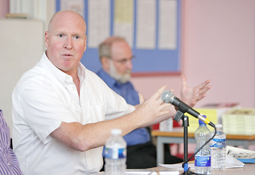One of the first events as Féile an Phobail began yesterday was a talk given by historian Pat Walsh on the Catholic Political Predicament in Northern Ireland, to coincide with the launch of his book, Catastrophe.
Held in St Mary’s University College, the talk covered the Catholic plight post-partition as nationalists found themselves cut off from the Irish state and the United Kingdom, and imprisoned in the ‘pseudo state’ of Northern Ireland.
Walsh argues that in 1920 both Catholics and Protestants didn’t want a ‘Northern Ireland’. Carson had never asked for a Parliament for the six counties and envisaged the dangers of unionists being cut off from the rest of the UK. That, he says, has manifested itself in the unionist insecurity that we see today as regards to flags and parades.
On the declaration of War in 1914, as West Belfast MP Joe Devlin called for men to enlist in the British Army, Walsh says the Falls Road was covered in Union Jacks. The unionists don’t know what they lost, he argues, by opposing Home Rule. Around this same time Joe Devlin’s Hibernians from Belfast were used to smash up Sinn Féin meetings as far away as Munster. West Belfast was a very different place.
However, what was important to Britain in 1920 was not the new Northern Ireland, it was the whole island. Northern Ireland is a false front, he says, where the South had to be on good behaviour to attain it.
In 1921 Michael Collins arrived in Armagh and promised to smash Northern Ireland. As a result northern nationalists republicanised and an IRA HQ was set-up in St Mary’s Hall in Belfast with northern officers put on Collins’ payroll. The promised northern offensive was a mess when the southern IRA failed to show up, the Civil War began in the rest of the island, and Collins was soon dead. Catholic Belfast bore the brunt of unionist violence that followed, and while many of the IRA in the north still held Collins dear, others like Cahir Healy, who would become MP for Fermanagh and Tyrone and who had been a close associate of Collins, would never forgive him for raising Catholic hopes and in the end leaving them to the mercy of the Orange state.
Walsh argues that Catholics sought escape on several occasion over the following decades, first by looking to merge the Nationalist Party with Fianna Fáil (which was rejected by De Valera) and then with the British Labour Party (which Labour rejected). With eight policemen to every citizen of the North at one time – something which even Nazi Germany didn’t have – the state could cope with intermittent IRA campaigns, however, it could not cope with the Civil Rights campaign, bringing unwanted media attention to the Catholic plight in the North, eventually overheating and exploding in war in 1969.
Walsh says that Taoiseach Seán Lemass must take blame for setting off a chain of events that led to the conflict by involving himself in the North after De Valera had effectively ignored it, having stated that he would rather have partial independence that unity. Paradoxically he also blames British Labour for the opposite reason – they ignored the North when in office and did not try to reform it.
But by then it was too late. Nationalists had been bottled up for so long, but by now the Catholic genie was out. After being let down by Collins in 1921 and Taoiseach Jack Lynch in 1969 Catholics were no longer waiting for deliverance from the South. For the first time since the founding of the state Catholics were organised and looking after themselves.
This was a very interesting talk and discussion that followed, and considering it’s only a taster of his book, Pat Walsh’s Catastrophe should be well worth a read.






